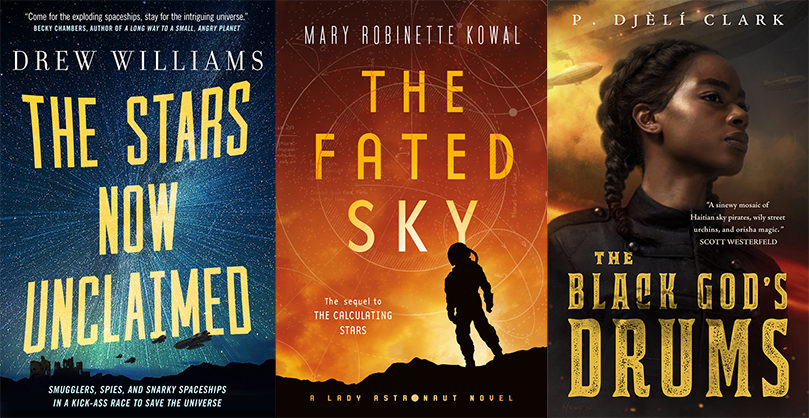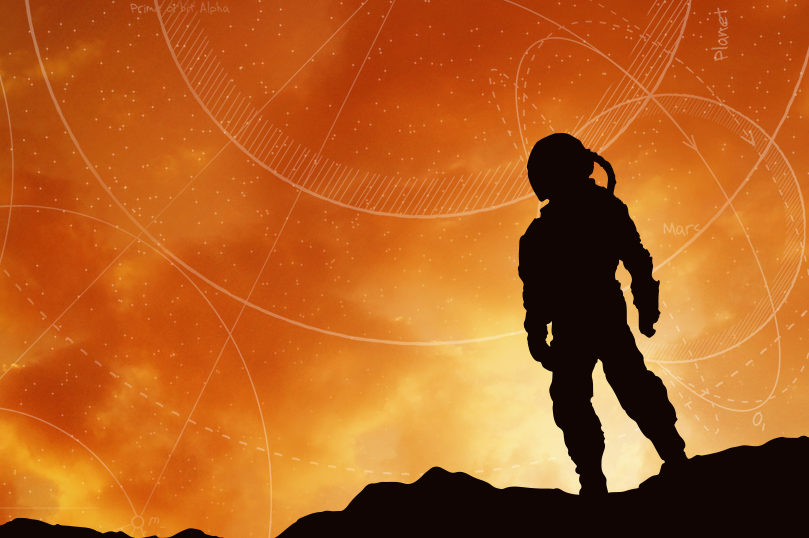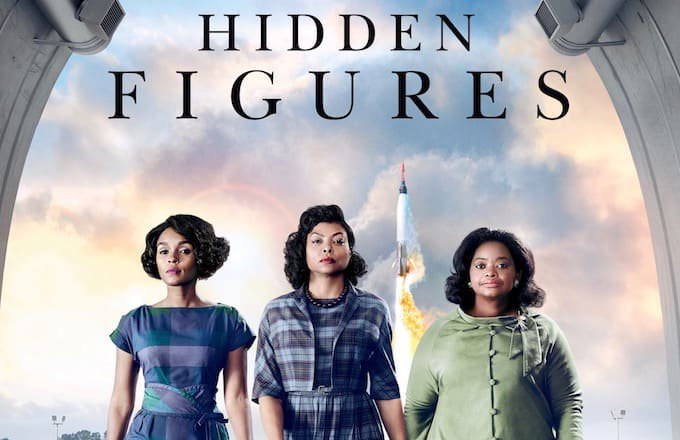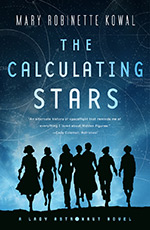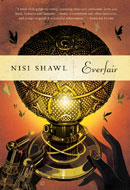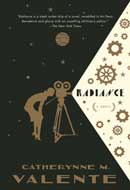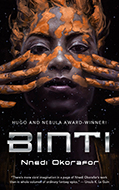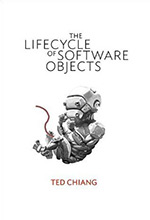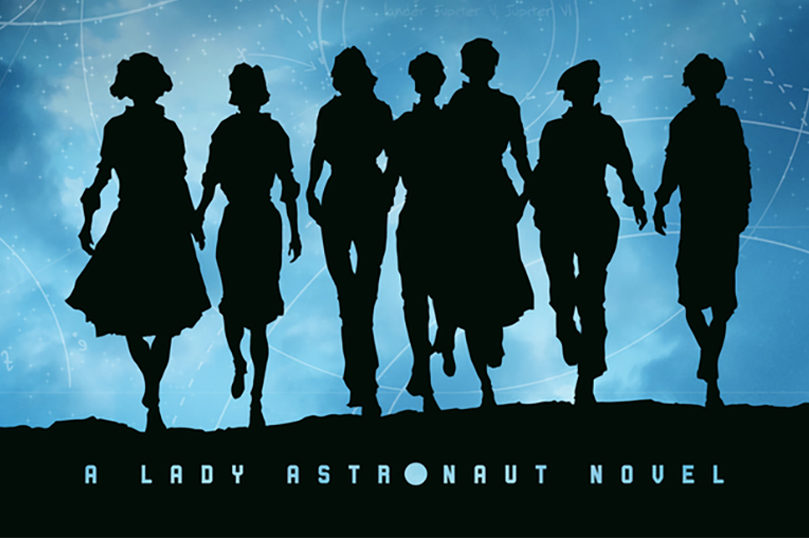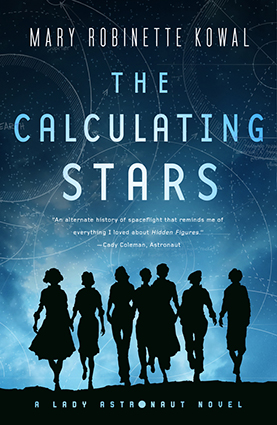opens in a new window opens in a new window
opens in a new window opens in a new window
opens in a new window opens in a new window
opens in a new window opens in a new window
opens in a new window
opens in a new window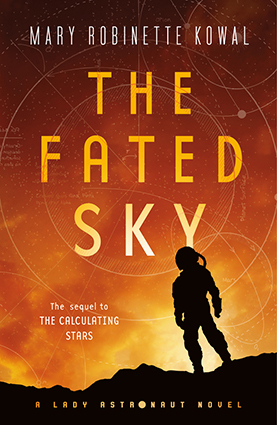 Welcome to #FearlessWomen! Continuing the grand sweep of alternate history begun in The Calculating Stars, The Fated Sky looks forward to 1961, when mankind is well-established on the moon and looking forward to its next step: journeying to, and eventually colonizing, Mars.
Welcome to #FearlessWomen! Continuing the grand sweep of alternate history begun in The Calculating Stars, The Fated Sky looks forward to 1961, when mankind is well-established on the moon and looking forward to its next step: journeying to, and eventually colonizing, Mars.
Of course the noted Lady Astronaut Elma York would like to go, but there’s a lot riding on whoever the International Aerospace Coalition decides to send on this historic—but potentially very dangerous—mission? Could Elma really leave behind her husband and the chance to start a family to spend several years traveling to Mars? And with the Civil Rights movement taking hold all over Earth, will the astronaut pool ever be allowed to catch up, and will these brave men and women of all races be treated equitably when they get there? This gripping look at the real conflicts behind a fantastical space race will put a new spin on our visions of what might have been.
opens in a new windowThe Fated Sky will be available on August 21st. Please enjoy this excerpt.
Chapter One
Do you remember where you were when the Friendship probe reached Mars? I was getting ready to return from the moon. I’d been up in Artemis Base for a three-month rotation, flying geologists from our tiny colony out to different survey sites.
While we were all called astronauts, only a handful of us were also pilots, by which I mean glorified bus drivers. The rest of the two hundred “citizens” came and went, depending on their area of expertise. Only fifty or so were “permanent” residents in the underground bunkers we called home.
Along with half the population of the base, I skip-walked in the light gravity through a buried gerbil tube called “Baker Street” toward “Midtown.” With no atmosphere to protect us from the cosmic rays hitting the moon, we’d scraped up a layer of the moon’s surface and buried the tubes in regolith. Aesthetically, the outside of the base looked like a decaying sandcastle. The inside was mostly smooth rubber, occasionally punctuated with light wells, aluminum supports, and pressure doors.
One of the doors hissed open, and Nicole hopped through, holding the handle. She pulled the door closed behind her and dogged it shut.
I spread my legs to kill my momentum as I landed from my last skip. She’d rotated to a position here on the last ship and it was darn good to see her. “Good morning.”
“I thought you were Earthbound.” Like me, Nicole was wearing a light pressure suit, and had the rubberized safety helmet tethered at her waist like a gas mask from the war. It wasn’t much, but in case one of the tubes was breached, it would give us ten minutes of oxygen to get to safety.
“I am, but I wasn’t going to miss the first Mars probe landing.” I was currently on rotation as a copilot for the small shuttle from the base to IAC’s Lunetta orbiting platform. It wasn’t much more than a space bus, but the big ships like the Lunetta-to-Earth, Solaris class, were all piloted by men—not that I was irritable about that or anything. I patted the carryall that hung over one shoulder. “Heading straight to the Lunetta rocket after this.”
“Say hello to a hot shower for me.” She joined me in skip-walking down Baker Street. “Do you think we’ll see Martians?”
“Not likely. It looks almost as bleak as the moon, at least from the orbital pictures.” We reached the end of Baker Street. The delta-pressure gauge on the panel by the door read lunar normal 4.9 psi, so I pumped the rachet handle to open it. “Nathaniel says he’ll pull out his own eyeteeth if there are Martians.”
“That’s . . . graphic. Speaking of, how is he?”
“Good.” I pulled the door open. “He’s been making noises about . . . ah . . . rocket launches.”
Laughing, Nicole slid into the Baker Street-Midtown airlock. “Honestly, you two are like newlyweds.”
“I’m never home!”
“You should get him up here again to visit.” She winked at me. “I mean, now that private quarters are an option.”
“Yeah . . . You and the senator should probably put a little more thought into how well the air ducts carry sound.” I started pulling the hatch shut.
“Hold the door!” In Baker Street, Eugene Lindholm bounded toward us with loping strides. If you’ve never seen someone move in low gravity, it’s sort of like mixing the grace of a toddler skipping with the ground-eating stride of a cheetah.
I pushed the door open wider. He corrected badly and cracked his head on the frame as he came through.
“Are you okay?” Nicole caught his arm to steady him.
“Thanks.” He pressed a hand against the ceiling as he caught his balance. The other hand held a sheaf of papers.
Nicole glanced at me before she moved over to the door into Midtown. I nodded and dogged the Baker Street door shut, but she didn’t open the next door.
“So . . . Eugene. As someone who flies with Parker . . .” She gestured at the papers in his hand. “I don’t suppose you want to ‘accidentally’ drop some of those?”
He grinned. “If you’re hoping for duty rosters, all I’ve got are recipe clippings for Myrtle.”
“Drat.” She opened the hatch and we headed into Midtown.
Wafting in from the pressure difference came a scent rare on the moon, loam and green and the soft scent of water. The center of the colony had a broad open dome that allowed in filtered light, which nurtured the plants growing here. It was our first really permanent structure.
The areas along the walls had been partitioned into living quarters. Sometimes I wished I were still berthed here, but the newer pilots’ quarters were conveniently located by the ports. Other cubicles had been erected for offices and our one restaurant. There was also a barber shop, a secondhand store, and an “art museum.”
The very center held a tiny “park.” By “park,” I mean it wasn’t much bigger than a pair of king-sized beds, with a path through the middle. But it was green.
What did we grow in this carefully ameliorated soil? Dandelions. Turns out, when properly prepared they are tasty and nutritious. Another favorite, prickly pear, has beautiful flowers that turn into sweet seedpods, and flat pads that can be roasted or baked. It turns out that many of nature’s weeds were well suited to growing in nutrition-poor soil.
“Hot dog.” Eugene slapped his thigh. “The dandelions are in bloom. Myrtle has been threatening to try her hand at dandelion wine.”
“By ‘threatening,’ you mean promising, right?” Nicole bounded past the raised beds. “Oh, Elma, also say hello to a dry martini for me when you get home.”
“I’ll make it a double.” I had thought that Nathaniel and I would be some of the first settlers on the moon, but with the Artemis Base established, the agency had turned its attention to settling Mars, and he had to stay on Earth for planning purposes.
Mars consumed everyone’s conversations at the IAC. The computers sitting over their equations. The punch card girls keying in endless lines of code. The cafeteria ladies ladling out mashed potatoes and green peas. Nathaniel, with his calculations . . . Everyone talked about Mars.
And it was no different on the moon. On the far side of Midtown, they had brought out a giant four-foot television screen from the launch center and erected it on a sort of podium. It looked like half the colony was here, crowded around the TV.
The Hilliards had brought a blanket and what looked like a picnic lunch. They weren’t the only ones who were turning this into a social occasion. The Chans, Bhatramis, and Ramirezes had also set up on the ground near the podium. There weren’t any children yet, but aside from that, it was almost like a real town.
Myrtle had a blanket set up too, and waved Eugene over. He smiled and waved back. “There she is. Want to join us, ladies? We’ve got plenty of room on the blanket.”
“Thanks! That would be lovely.”
I followed him over to the blanket, which looked to have been quilted together from old uniforms, and settled down with Eugene and Myrtle. She’d trimmed her hair from its bouffant into something more suitable to the moon, mostly because aerosols were not a great thing to have in space. She and Eugene had volunteered to be some of the permanent residents. I sorely missed them when I was on Earth.
“Hey!” A voice from the front of the crowd cut through the murmur of conversation. “It’s starting.”
I rose onto my knees to see over the heads of the folks in front of us. In grainy black and white, the TV showed a broadcast from Mission Control in Kansas, though we were getting it with a 1.3-second delay. I studied each image, looking for Nathaniel. I loved my job, but being away from my husband for months at a time was challenging. Sometimes I thought that quitting and going back to being a computer would be appealing.
On the screen, I could see Basira working away on equations as the teletype coughed out pages. She drew a strong line under a number and lifted her head. “The Doppler signature indicates that the two-stage separation has occurred.”
My heart ratcheted up, because this meant that the probe was about to enter the Martian atmosphere. Or, rather, it had entered already. The weird thing was that all the numbers she was getting from Mars were twenty minutes old. The mission had either already succeeded or failed.
Twenty minutes old—I glanced at my watch. How much time did I have before I had to be in the hangar?
Nathaniel’s voice came over the television and I inhaled with longing. “Atmospheric entry in three, two, one . . . Speed 117,000 kilometers. Downrange distance to landing site is 703 kilometers. Expected parachute deploy in five seconds. Four. Three. Two. One. Mark. Awaiting confirmation . . .”
The entire dome seemed to hold its breath, leaving only the constant low hum of fans to stir the air. I leaned toward the screen, as if I could see the numbers coming off the teletype or help Basira with the math. Though, in truth, it had been four years since I’d been in the computer department or doing anything more complicated than basic orbital mechanics.
“Confirm parachute. Parachute has been detected.”
Someone let out a whoop in the dome. We weren’t down yet, but oh—it was close. I wrapped my fingers in a corner of the quilt, clutching it as if I could steer the probe from here.
“Awaiting confirmation from the spacecraft that retro-rocket ignition has occurred.” Still, Nathaniel was talking about an event that had happened twenty minutes ago, while I was listening to his voice from 1.3 seconds ago. The vagaries of life in space.
“At this point in time, we should be on the ground.”
Please, oh, please let him be right. Because if they failed to land that probe, the Mars mission would come to a sudden and grinding halt. I looked at my watch again. He should be announcing confirmation of the landing, but the seconds just ticked by.
“Please stand by. We are awaiting confirmation from the Deep Space Network and the Lunetta relay station.” Nathaniel wasn’t on the screen now, but I could picture him standing at his desk, a pencil gripped so tightly in his fist that it could break at any moment.
A tone sounded.
Beside me, Nicole inhaled sharply. “What is that?”
The tone repeated, and Mission Control dissolved into cheering. Nathaniel’s voice rose as he fought to be heard over the din. “What you’re hearing, ladies and gentlemen, is the confirmation tone from our Mars probe. This is the first broadcast from another planet. Confirmed. Friendship has landed, paving the way for our manned mission.”
I jumped to my feet—we all did—and forgot about gravity. Laughing and soaring awkwardly through the air, I cheered for the success of the Friendship probe and the team who had planned the mission.
“You’re late.” Grissom glowered at me as I swung into the pilot’s lounge by the port. He had his travel duffle resting by the bench and sipped from a squeeze pouch of coffee.
I glanced at the wall clock. “By thirty seconds.”
“That’s still late.”
He was right, but no one else was there to notice, and launch wasn’t for another two hours. “And you’re still ugly.”
“Heh. I figured you were watching the landing?” He passed me our flight plans to review as we walked to the ship. Grissom grumbled a lot, but he was as much of a space junkie as I was.
I nodded, flipping through the pages of burn times and rates, attitude and velocity. We’d spend three days making the transit to Lunetta, during which time there wasn’t much to do but monitor gauges. Heck, even the slow pressure increase from moon base psi to Lunetta’s standard psi was automated. “There’s not anything to see yet, but I just wanted to . . . I don’t know. Be there.”
Grissom grunted. “Yeah . . . I watched the moon landing the same way.”
Silence hung between us for a moment with the reminder that I had been on that mission three years ago. It had turned me into something of a celebrity, which was part of why I probably enjoyed life on the moon a little more than life on Earth. I didn’t have to deal with fans. Usually.
“Did you watch it? The Mars landing, I mean.”
“Nah. Listened to it on the radio.” He shrugged as we reached the corridor leading to our ship. “Spent some time with my girl before heading out. They’re rotating me down to the Brazilian spaceport for a month to train on the new ship.”
“The Polaris class?” I whistled when he nodded. “Confirmed, jealousy.”
He snorted. “It’ll take a week for me to even stand, I’ve been up here so long. The training itself won’t take more than two weeks.”
“Still. The specs on it make it look like a dream. Plus Brazil beats Kansas.” I stopped at the hatch to the pilot cabin for the taxi and checked to make sure the delta-pressure gauge was at 4.9 before opening the hatch. There was always a chance that there wasn’t a ship on the other side, even though we were at the right port. “A vertical landing will make everything so much easier when going home.”
“Won’t be as smooth as the moon lander.” He shrugged. “I’m fond of the glider myself. Get to see more on approach, but this won’t be as weather dependent, and with the hurricanes getting worse . . . On the other hand, I don’t mind the extra days in orbit waiting for a hole.”
“Sure, but that’s because you’re a wimp about gravity acclimation.” I ducked into the compact pilots’ compartment. The limp artificial gravity on Lunetta’s rotating section was one-third that of Earth—just like Mars—and made a good transition for people coming back from the moon. “I’m hoping for good weather when we head down. Can’t wait to get home.”
“Then maybe you should have been on time.”
I stuck my tongue out at him, laughing, and we got down to the business of our preflight check. One of the nice things about a takeoff from the moon is that there are far fewer variables than on Earth. Without any atmosphere to speak of, we didn’t have to deal with weather or wind or anything, really, except a little bit of gravity.
The passenger compartment behind us could hold twenty people. Most flights, it was completely full of specialists who were rotating back to Earth after whatever project they’d come up for had finished. The cargo hold, likewise, would be filled with personal luggage, science experiments, and our very few export items. For instance, one of the geologists had begun carving moon rock, and her sculptures were selling for astonishing amounts back on Earth. Myrtle’s “moon quilts” from recycled fabric also fetched enough to finance all three of their sons through graduate school. The arts were surprisingly alive and well in space. I’d even joined in with a sort of paper sculpture made from old punch cards, but hadn’t quite gotten up the gumption to try to sell them.
Even people on Earth who didn’t like the space program got all excited by anything coming from the moon. I guess if you spend millennia romanticizing a place in myths and legends, it takes a while to wear off.
Grissom and I had flown together often enough that we had the preflight check down to a routine. Not that we skipped any steps. Routine or no, weather or no, we were still sitting atop what was basically a bomb.
It’s funny . . . the way you can get used to anything.
Two hours later, we’d finished our checklist, and the passengers were all strapped into their seats. Grissom looked over at me and nodded. “Let’s light this candle.”
The engines whispered to life, nearly silent on the airless surface of the moon. We lifted off and in that acceleration I felt weight again, as if the moon wanted to pull me back down to it. Below us, the gray-and-brown craters fell away, washed in the flames of our exhaust.
I said you can get used to anything. I might have lied.
Arriving in low Earth orbit and docking with the orbital station, I was a pilot astronaut: even sitting in the copilot seat and mostly handling navigation calculations, I was intimately involved in the procedure. Grissom and I handed off our ship to the replacement pilots, who were heading out for their three-month stint on the moon, and drifted inside.
Leaving Lunetta, I was just another Earthbound passenger dropping out of orbit. So far, the International Aerospace Coalition had yet to staff any women as pilots on the big orbital rockets. It wasn’t official policy that we weren’t allowed to pilot them, but when I inquired, I always got something along the lines of how they wanted to use my expertise “where it’s most valuable.” Since the lady astronauts had gotten into the corps on the strength of our computing skills, it was hard to get them to let us sit in a different seat.
I floated into the passenger compartment with the rest of the Earthbound folks. While Lunetta had artificial gravity in the spinning outer ring, the center remained stationery for docking purposes. It made handling luggage easier and harder at the same time. It weighed nothing, but also had a tendency to wander off if you didn’t strap it down. I wedged my bag into the small compartment beneath my seat and tightened the tie-down straps before shutting the compartment door.
“Elma!” In the aisle floated Helen Carmouche, née Liu. She wore her dark hair pulled back in a ponytail and the ends floated above her head.
“I didn’t know you would be on this rocket.” Grinning, I pushed myself up to hug her, almost overshooting the mark—I’d gotten used to having at least the moon’s microgravity—but Helen hooked a foot under a rail like a zero-g pro and caught me.
Remember what I said about how you can get used to anything? This did not feel much different than running into her on a streetcar or train.
“We need to do some Earthside training.” She eyed the couch next to me. “May I?”
“Absolutely!” I swung up to let her pass beneath me. “How’s Reynard?”
She laughed as she tucked her bag into the compartment. “He says he has repainted the living room. I dread to see it.”
I pulled myself closer to the “ceiling” to let other passengers through. “Color choice or skill?”
“Two words: Martian. Red. But how would he know?” She shook her head, yanking on the tie straps with practiced ease. “We don’t have pictures from the surface yet.”
“It could be worse. It could be regolith gray.”
“Neutral may be better.” She closed the hatch of the luggage compartment with a click. “How’s Nathaniel?”
I sighed, without meaning to. It just slipped out. “Good?”
She straightened, catching herself on the seat. “That not sound good.”
“No, no. He’s fine. Everything is fine.” I pulled myself down to my seat and began strapping in. As I worked the shoulder straps into place, I could feel Helen staring at me. “It’s just hard being gone so much. You know how it is.”
She settled into the seat next to me and patted my hand. “At least we are going home.”
“I’m sorry—I shouldn’t complain, not about a three-month separation.” Helen was on the Mars mission team, so she had been training for fourteen months, and when the expedition left next year, she and Reynard would be separated for another three years. “I honestly don’t know how you’re going to do it.”
“It would be harder, I think, if we had been married longer.” She winked. “Keeps honeymoon going. You know? When I come home . . .”
“You have ignition?”
“All thrusters firing.”
Overhead the speakers crackled into life. “Ladies and gentlemen, this is Captain Cleary. We will push back from the station in a moment, and should have you back on Earth at the Kansas Astrofield in about an hour.”
Routine. I’d made the trip between Earth and the moon about a dozen times. On each trip things became a little more polished. A little more . . . normal. It really wasn’t any different now than a cross-country train trip. Except, of course, for everything.
A slight clunk reverberated through the ship as the locking mechanism released from the station. Outside the tiny porthole, fireflies seemed to eddy as the frozen condensation on the spacecraft’s skin came out of the station’s shadow and into the light of the sun. The frost flurried around us, luminescent against the ink of space.
I keep trying to say that this is nothing more than a routine, but the truth is that it is magic. Around us the great arc of the station swept in dizzying circles. If I hadn’t been strapped in, I would have leaned forward and pressed my face against the window.
“There!” Helen pointed to something just out of sight ahead of us. “The Mars fleet.”
The ship vibrated and began a slow rotation, coming around into position for dropping out of orbit. As it did, the three-ship fleet designed for the First Mars Expedition panned into view. Against the ink-black sky, the two passenger ships and the supply ship stood out as irregular cylinders, the passenger ships long and slender, girdled with a centrifugal ring like the space station. Someone had likened the ring to an . . . adult toy, which told me two things: one, that I was more of a prude than I thought I was, and two, what that particular item must look like and how it might function. I had yet to ask Nathaniel about it, because I wasn’t sure if I wanted to know if he knew what it was.
In any case, if you did not have experience with such things, the ships were an innocently beautiful sight. “You know . . . there are times when I’m a little jealous of y’all.”
“Eh.” Helen shrugged. “I’ll be doing math all the way there and back.”
“Why do you think I’m jealous?” I rolled my eyes. “I’m basically a bus driver.”
“On the moon.”
“True. And I love it, but . . . it’s not very challenging.” I probably could have gotten on the Mars mission if I’d wanted to, but the truth is that Nathaniel and I had been talking about children. “I’m thinking about retiring as a pilot and maybe going back to the computer department.”
Helen is the queen of the disdainful snort. “And go back to flying a Cessna?”
“Or doing training for incoming astronauts. I’m just . . .” Bored. “I want to focus on my marriage.”
Helen gave me one of her patented sniffs. She really is a master of those little noises of disbelief. I was saved from the full brunt of her scorn when the rocket shuddered as the captain fired the deorbit burn.
Behind us, someone whimpered a little. Helen glanced over her shoulder and leaned closer to me. “Just wait until we hit the entry interface.”
“Must be their first return to Earth.” I did not glance back. Grandma had always said that when someone was embarrassed, the cruelest thing you could do was stare at them, and I understood what they were feeling. Even with training, there was nothing like the real thing, and it was going to get a lot worse before we got down.
Helen and I chatted through the first half hour, catching up on life in space. Then a piece of popcorn began a slow fall from someone’s bag. That first sign of gravity was our indication that we’d fallen far enough toward Earth for the atmosphere to be slowing us down.
Outside, we began the slow process of heating up to 1,649 degrees Celsius. Outside the windows, the air began to glow orange with streamers of superheated atmosphere whipping past us in a wake of plasma. What’s funny is how quiet it gets during this part of the descent. We aren’t in enough atmosphere to cause vibrations, and are basically a big glider, so there’s no engine noise. But even quieter are the astronauts inside, watching the spectacle of reentry. It never gets old.
The captain banked the ship in the first of a series of long S curves to kill some of our speed. The g-forces grabbed at us, pulling me down into my couch. It was only two G, but after months at one-sixteenth, it felt as though I were buried in mud.
The g-forces continued to rise, pressing me into the side of my couch. I waited for the captain to pull us out of the turn into the next part of the S curve, but the rotation continued. This was not routine.
And being stuck in the passenger compartment, there was not a darn thing I could do.
Copyright © 2018 by Mary Robinette Kowal
Order Your Copy
opens in a new window opens in a new window
opens in a new window opens in a new window
opens in a new window opens in a new window
opens in a new window opens in a new window
opens in a new window
opens in a new window
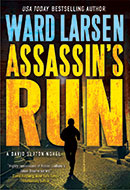 Ward Larsen’s Assassin’s Run revives globe-trotting, hard-hitting assassin David Slaton for another breathless adventure. When a Russian oligarch is killed by a single bullet on his yacht off the Isle of Capri, Russian intelligence sources speculate that a legendary Israeli assassin, long thought dead, might be responsible. However, David Slaton—the assassin in question—is innocent. Realizing the only way to clear his name is to find out who’s truly responsible, he travels to Capri.
Ward Larsen’s Assassin’s Run revives globe-trotting, hard-hitting assassin David Slaton for another breathless adventure. When a Russian oligarch is killed by a single bullet on his yacht off the Isle of Capri, Russian intelligence sources speculate that a legendary Israeli assassin, long thought dead, might be responsible. However, David Slaton—the assassin in question—is innocent. Realizing the only way to clear his name is to find out who’s truly responsible, he travels to Capri.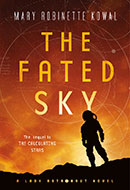 Mary Robinette Kowal continues the grand sweep of alternate history begun in The Calculating Stars, The Fated Sky looks forward to 1961, when mankind is well-established on the moon and looking forward to its next step: journeying to, and eventually colonizing, Mars.
Mary Robinette Kowal continues the grand sweep of alternate history begun in The Calculating Stars, The Fated Sky looks forward to 1961, when mankind is well-established on the moon and looking forward to its next step: journeying to, and eventually colonizing, Mars.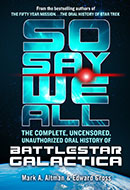 Four decades after its groundbreaking debut, Battlestar Galactica — both the 1978 original and its 2004 reimagining ? have captured the hearts of two generations of fans. What began as a three-hour made for TV movie inspired by the blockbuster success of Star Wars followed by a single season of legendary episodes, was transformed into one of the most critically acclaimed and beloved series in television history. And gathered exclusively in this volume are the incredible untold stories of both shows – as well as the much-maligned Galactica 1980.
Four decades after its groundbreaking debut, Battlestar Galactica — both the 1978 original and its 2004 reimagining ? have captured the hearts of two generations of fans. What began as a three-hour made for TV movie inspired by the blockbuster success of Star Wars followed by a single season of legendary episodes, was transformed into one of the most critically acclaimed and beloved series in television history. And gathered exclusively in this volume are the incredible untold stories of both shows – as well as the much-maligned Galactica 1980.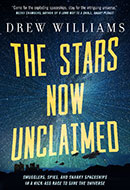 Think big guns, smugglers, epic space battles, and a telekinetic girl with all the gifts.
Think big guns, smugglers, epic space battles, and a telekinetic girl with all the gifts.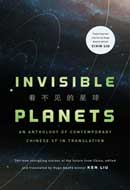 Science fiction readers the world over have recently become familiar with Ken Liu’s Chinese translation work via The Three-Body Problem, the bestselling and Hugo award-winning novel by acclaimed Chinese author Cixin Liu. Ken Liu has now assembled, translated, and edited an anthology of Chinese science fiction stories, the most comprehensive collection yet available in the English language, sure to thrill and gratify readers developing a taste and excitement for Chinese SF.
Science fiction readers the world over have recently become familiar with Ken Liu’s Chinese translation work via The Three-Body Problem, the bestselling and Hugo award-winning novel by acclaimed Chinese author Cixin Liu. Ken Liu has now assembled, translated, and edited an anthology of Chinese science fiction stories, the most comprehensive collection yet available in the English language, sure to thrill and gratify readers developing a taste and excitement for Chinese SF. Written with the literary flair and historical accuracy readers expect from Ralph Peters, Judgment at Appomattoxtakes readers through the Civil War’s last grim interludes of combat as flags fall and hearts break.
Written with the literary flair and historical accuracy readers expect from Ralph Peters, Judgment at Appomattoxtakes readers through the Civil War’s last grim interludes of combat as flags fall and hearts break.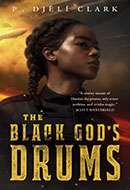 In an alternate New Orleans caught in the tangle of the American Civil War, the wall-scaling girl named Creeper yearns to escape the streets for the air – in particular, by earning a spot on-board the airship Midnight Robber. Creeper plans to earn Captain Ann-Marie’s trust with information she discovers about a Haitian scientist and a mysterious weapon he calls The Black God’s Drums.
In an alternate New Orleans caught in the tangle of the American Civil War, the wall-scaling girl named Creeper yearns to escape the streets for the air – in particular, by earning a spot on-board the airship Midnight Robber. Creeper plans to earn Captain Ann-Marie’s trust with information she discovers about a Haitian scientist and a mysterious weapon he calls The Black God’s Drums.
